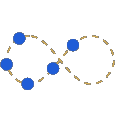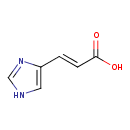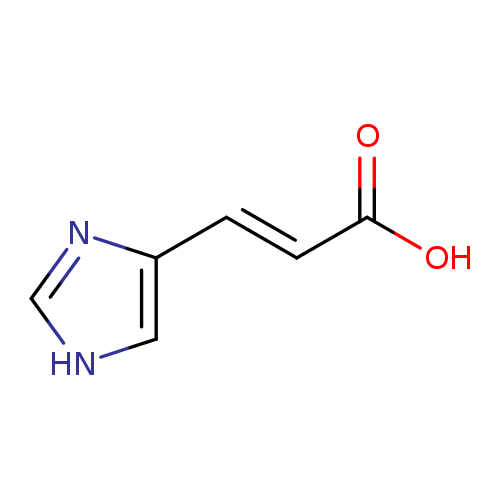|
Record Information |
|---|
| Version |
1.0 |
|---|
| Update Date |
1/22/2018 11:54:54 AM |
|---|
|
Metabolite ID | PAMDB110182 |
|---|
|
Identification |
|---|
| Name: |
urocanate |
|---|
| Description: | A urocanate obtained by deprotonation of the carboxy group of trans-urocanic acid; major species at pH 7.3. |
|---|
|
Structure |
|
|---|
| Synonyms: | -
urocanic acid
-
trans-urocanate
|
|---|
|
Chemical Formula: |
C6H5N2O2
|
|---|
| Average Molecular Weight: |
137.12 |
|---|
| Monoisotopic Molecular
Weight: |
138.0429274472 |
|---|
| InChI Key: |
LOIYMIARKYCTBW-OWOJBTEDSA-M |
|---|
| InChI: |
InChI=1S/C6H6N2O2/c9-6(10)2-1-5-3-7-4-8-5/h1-4H,(H,7,8)(H,9,10)/p-1/b2-1+ |
|---|
| CAS
number: |
104-98-3 |
|---|
| IUPAC Name: | (2E)-3-(1H-imidazol-4-yl)prop-2-enoate |
|---|
|
Traditional IUPAC Name: |
trans-urocanic acid |
|---|
| SMILES: | C1(NC=NC=1C=CC([O-])=O) |
|---|
|
Chemical Taxonomy |
|---|
|
Taxonomy Description | This compound belongs to the class of organic compounds known as imidazolyl carboxylic acids and derivatives. These are organic compounds containing a carboxylic acid chain (of at least 2 carbon atoms) linked to an imidazole ring. |
|---|
|
Kingdom |
Organic compounds |
|---|
| Super Class | Organoheterocyclic compounds |
|---|
|
Class |
Azoles |
|---|
| Sub Class | Imidazoles |
|---|
|
Direct Parent |
Imidazolyl carboxylic acids and derivatives |
|---|
| Alternative Parents |
|
|---|
| Substituents |
- Imidazolyl carboxylic acid derivative
- Heteroaromatic compound
- Azacycle
- Monocarboxylic acid or derivatives
- Carboxylic acid
- Carboxylic acid derivative
- Organic nitrogen compound
- Organic oxygen compound
- Organopnictogen compound
- Organic oxide
- Hydrocarbon derivative
- Organooxygen compound
- Organonitrogen compound
- Carbonyl group
- Aromatic heteromonocyclic compound
|
|---|
| Molecular Framework |
Aromatic heteromonocyclic compounds |
|---|
| External Descriptors |
|
|---|
|
Physical Properties |
|---|
| State: |
Solid |
|---|
| Charge: | -1 |
|---|
|
Melting point: |
225 °C |
|---|
| Experimental Properties: |
| Property | Value | Reference |
|---|
| Melting Point | 225 °C | Not Available | | Boiling Point | Not Available | Not Available | | Water Solubility | 1.5 mg/mL at 17 °C | Not Available | | LogP | Not Available | Not Available |
|
|---|
| Predicted Properties |
|
|---|
|
Biological Properties |
|---|
| Cellular Locations: |
Not Available |
|---|
| Reactions: | |
|---|
|
Pathways: |
|
|---|
|
Spectra |
|---|
| Spectra: |
| Spectrum Type | Description | Splash Key | |
|---|
| GC-MS | GC-MS Spectrum - GC-EI-TOF (Pegasus III TOF-MS system, Leco; GC 6890, Agilent Technologies) (2 TMS) | splash10-014m-1930000000-25b091170cc3ea73bcf7 | View in MoNA |
|---|
| GC-MS | GC-MS Spectrum - GC-EI-TOF (Pegasus III TOF-MS system, Leco; GC 6890, Agilent Technologies) | splash10-00l5-1930000000-5c3c875338a517d52729 | View in MoNA |
|---|
| GC-MS | GC-MS Spectrum - GC-EI-TOF (Pegasus III TOF-MS system, Leco; GC 6890, Agilent Technologies) (2 TMS) | splash10-00di-9410000000-b58e1b2cdd5c12a6ba24 | View in MoNA |
|---|
| GC-MS | GC-MS Spectrum - GC-MS (2 TMS) | splash10-0159-3950000000-433e50271e182f8408fd | View in MoNA |
|---|
| LC-MS/MS | LC-MS/MS Spectrum - Quattro_QQQ 10V, Positive (Annotated) | splash10-00di-3900000000-8c1c060d06c1ce3fb5f7 | View in MoNA |
|---|
| LC-MS/MS | LC-MS/MS Spectrum - Quattro_QQQ 25V, Positive (Annotated) | splash10-00kf-9000000000-ae9de21d4642045fb96c | View in MoNA |
|---|
| LC-MS/MS | LC-MS/MS Spectrum - Quattro_QQQ 40V, Positive (Annotated) | splash10-014l-9000000000-8e6978d7f104386d2e82 | View in MoNA |
|---|
| LC-MS/MS | LC-MS/MS Spectrum - EI-B (HITACHI M-80) , Positive | splash10-000f-9200000000-cb7f9025a0f6adf740c1 | View in MoNA |
|---|
| LC-MS/MS | LC-MS/MS Spectrum - LC-ESI-QQ (API3000, Applied Biosystems) 10V, Negative | splash10-000i-1900000000-c628b05706544cb1ebdc | View in MoNA |
|---|
| LC-MS/MS | LC-MS/MS Spectrum - LC-ESI-QQ (API3000, Applied Biosystems) 20V, Negative | splash10-0006-9300000000-bc4c631410a5cbb3c2f5 | View in MoNA |
|---|
| LC-MS/MS | LC-MS/MS Spectrum - LC-ESI-QQ (API3000, Applied Biosystems) 30V, Negative | splash10-0006-9000000000-ccac569cbc78a632da48 | View in MoNA |
|---|
| LC-MS/MS | LC-MS/MS Spectrum - LC-ESI-QQ (API3000, Applied Biosystems) 40V, Negative | splash10-0006-9000000000-a22c861e4f2551a3f582 | View in MoNA |
|---|
| LC-MS/MS | LC-MS/MS Spectrum - LC-ESI-QQ (API3000, Applied Biosystems) 50V, Negative | splash10-00kf-9000000000-37421b473ba575d307fd | View in MoNA |
|---|
| LC-MS/MS | LC-MS/MS Spectrum - LC-ESI-QTOF (UPLC Q-Tof Premier, Waters) , Positive | splash10-00du-5900000000-29dc15087c785a19c0ee | View in MoNA |
|---|
| LC-MS/MS | LC-MS/MS Spectrum - LC-ESI-QTOF (UPLC Q-Tof Premier, Waters) , Negative | splash10-0006-9200000000-1cc9b0a66b83ca383ebd | View in MoNA |
|---|
| 1D NMR | 1H NMR Spectrum | Not Available |
|---|
| 2D NMR | [1H,13C] 2D NMR Spectrum | Not Available |
|---|
|
|---|
|
References |
|---|
| References: |
- Sastry CM, Whitmore SE, Breysse PN, Morison WL, Strickland PT: The effect of clinical UVA/B exposures on urinary urocanic acid isomer levels in individuals with caucasian type (II/III) skin types. Dermatol Online J. 2005 Dec 1;11(3):1. [16409897 ]
- Hug DH, Hunter JK, Dunkerson DD: The potential role for urocanic acid and sunlight in the immune suppression associated with protein malnutrition. J Photochem Photobiol B. 1998 Jul 10;44(2):117-23. [9757593 ]
- Snellman E, Jansen CT, Laihia JK, Milan T, Koulu L, Leszczynski K, Pasanen P: Urocanic acid concentration and photoisomerization in Caucasian skin phototypes. Photochem Photobiol. 1997 May;65(5):862-5. [9155258 ]
- Schwarz W, Langer K, Haag A: High-performance liquid chromatographic determination of (Z)-and (E)-urocanic acid in human skin. J Chromatogr. 1984 Sep 14;310(1):188-92. [6501514 ]
- Hermann K, Abeck D: Determination of histidine and urocanic acid isomers in the human skin by high-performance capillary electrophoresis. J Chromatogr B Biomed Sci Appl. 2000 Nov 10;749(1):41-7. [11129077 ]
- Kinuta M, Kinuta K, Yamada H, Abe T, Yoshida Y, Araki K, Li SA, Otsuka A, Nakanishi A, Moriyama Y, Takei K: Formation of S-[2-carboxy-1-(1H-imidazol-4-yl) ethyl]glutathione, a new metabolite of L-histidine, from cis-urocanic acid and glutathione by the action of glutathione S-transferase. Electrophoresis. 2003 Sep;24(18):3212-8. [14518047 ]
- Yokoya S, Tokuhiro E, Suwa S, Maesaka H: Measurement of the skin urocanic acid content in normal and histidinemic infants. Eur J Pediatr. 1983 Sep;140(4):330-2. [6628454 ]
- Morrison H: Photochemistry and photobiology of urocanic acid. Photodermatol. 1985 Jun;2(3):158-65. [3895185 ]
|
|---|
| Synthesis Reference: |
Yamamoto, Kozo; Sato, Tadashi; Tosa, Tetsuya; Chibata, Ichiro. Continuous production of urocanic acid by immobilized Achromobacter liquidum cells. Biotechnology and Bioengineering (1974), 16(12), 1601-10. |
|---|
| Material Safety Data Sheet (MSDS) |
Download (PDF) |
|---|
|
Links |
|---|
| External Links: |
|
|---|


